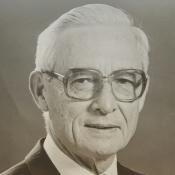Raymond John Chambers
 Among the most accomplished and respected accounting academicians in the world, Raymond John Chambers listed his recreations as "reading, writing and arithmetic." A voracious reader with a formidable vocabulary, he had even been known to study the dictionary. Possessed by a strong desire to see language used correctly, he studied the roots of words and that it is the right word in the context. What other accounting professor used the word "floccinavctinihilipalification"*? A very private person, he was devoted to his wife and their family--a son, two daughters, and seven grandchildren. He and his wife, Margaret, shared an interest in opera and usually had season tickets for the Sydney Opera season.
Among the most accomplished and respected accounting academicians in the world, Raymond John Chambers listed his recreations as "reading, writing and arithmetic." A voracious reader with a formidable vocabulary, he had even been known to study the dictionary. Possessed by a strong desire to see language used correctly, he studied the roots of words and that it is the right word in the context. What other accounting professor used the word "floccinavctinihilipalification"*? A very private person, he was devoted to his wife and their family--a son, two daughters, and seven grandchildren. He and his wife, Margaret, shared an interest in opera and usually had season tickets for the Sydney Opera season.
He was known as an effective administrator, in part because he could not be bothered wasting time on it. He dealt only with things that mattered. He made the important decisions, left the running of programs to those most directly involved, and got back to his "real" work. Taking advantage of his open door policy, his colleagues could walk into his office at will to argue a point, seek clarification, or get help with a reference. He would be writing when they walked in, put down his pen immediately, and given them his full attention. When the discussion was over, and that was sometimes hours later, he would pick up his pen and just carry on writing as if he had not been interrupted. A mean debater, he never forced his ideas on his colleagues, although on occasion he would talk for hours in efforts to convince them of the correctness of his arguments.
In this intense and exciting atmosphere, he founded a journal, Abacus, and forged with his colleagues a school of accounting thought built on a belief in the primacy of market prices. Indeed, that school of thought usually bears his name. A critic in the tradition of Canning, Hatfield, MacNeal, Paton and Sweeney, he had looked to economics, psychology, and science for evidence. His publications, which include numerous books and over 200 articles, are representatives of the turning point in the accounting literature away from descriptions of technical process toward rigorous debate based on scientific method. Further, he was not willing merely to understand what accountants do; he sought to bring about change to improve both the study and the practice of accounting. For over forty years, he had made many lecture tours at universities throughout the world.
Chambers was awarded a gold medal as one of the first recipients of the American Institute of Certified Public Accountants Notable Contribution to Accounting Literature Award. More than a dozen professors of accounting had studied under him or been his colleague during their formative years. He served as National President of the Australian Society of Accountants (now called the Australian Society of CPAS) which showed his commitment to the interaction between academe and the profession, and he held many other awards and distinctions including Officer of the Order of Australia and member of the Academy of Social Sciences of Australia. For all of these accomplishments, he was named the 51st inductee into the Accounting Hall of Fame, the first one from a "Pacific Rim" country.
Raymond John Chambers died on September 13, 1999 at age 81.
*The habit of treating things as trivial, as of no account.
 Among the most accomplished and respected accounting academicians in the world, Raymond John Chambers listed his recreations as "reading, writing and arithmetic." A voracious reader with a formidable vocabulary, he had even been known to study the dictionary. Possessed by a strong desire to see language used correctly, he studied the roots of words and that it is the right word in the context. What other accounting professor used the word "floccinavctinihilipalification"*? A very private person, he was devoted to his wife and their family--a son, two daughters, and seven grandchildren. He and his wife, Margaret, shared an interest in opera and usually had season tickets for the Sydney Opera season.
Among the most accomplished and respected accounting academicians in the world, Raymond John Chambers listed his recreations as "reading, writing and arithmetic." A voracious reader with a formidable vocabulary, he had even been known to study the dictionary. Possessed by a strong desire to see language used correctly, he studied the roots of words and that it is the right word in the context. What other accounting professor used the word "floccinavctinihilipalification"*? A very private person, he was devoted to his wife and their family--a son, two daughters, and seven grandchildren. He and his wife, Margaret, shared an interest in opera and usually had season tickets for the Sydney Opera season.